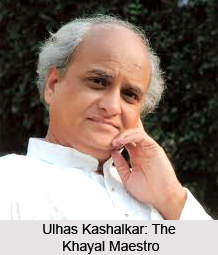 Ulhas Kashalkar, one of the leading representatives of Gwalior and Jaipur Gharanas, has earned wide recognition in India and abroad. He was initiated to music by his father Shri N.D.Kashalkar an able musicologist. A gold medallist at his post-graduation in music, he was later on trained by Pandit Ram Marathe and Pandit Gajananbua Joshi, stalwarts of Hindustani Classical Music. Torchbearer of India`s pristine musical tradition, Ulhas Kashalkar has been the continuing string to enthral and take his audiences on an ecstatic journey through his music.
Ulhas Kashalkar, one of the leading representatives of Gwalior and Jaipur Gharanas, has earned wide recognition in India and abroad. He was initiated to music by his father Shri N.D.Kashalkar an able musicologist. A gold medallist at his post-graduation in music, he was later on trained by Pandit Ram Marathe and Pandit Gajananbua Joshi, stalwarts of Hindustani Classical Music. Torchbearer of India`s pristine musical tradition, Ulhas Kashalkar has been the continuing string to enthral and take his audiences on an ecstatic journey through his music.
Gifted with a harmonious voice textured with the outlandish mellifluous strings and with terrific litheness and unmatchable flexibility; Kashalkar`s music appeals to musical epicurean. His gaykee is especially eminent for uncontaminated, unadulterated traditional rendering with his own aesthetic interpretation. Renowned cassette companies of India and abroad have brought out many cassettes and compact discs of his music, a testimonial to his immense popularity. He has performed extensively in India and abroad.
Early Life of Ulhas Kashalkar
Pandit Ulhas Kashalkar was born in Nagpur. His first guru was his father as he learnt first lessons in music from his father N D Kashalkar, a lawyer by profession and an amateur vocalist and musicologist. He went on to study music at Nagpur University, topping his post-graduate class. Around that time, he trained under Rajabhau Kogje and P N Khardenavis. With a blessed voice and the gifted ability to blend the three gayakees with authenticity and aesthetic excellence, he soon emerged to be one of the most formidable vocalists of the country. While his music remains well within the confines of tradition, the listener revels in an experience of listening to a seemingly new gayakee.
Ulhas Kashalkar initially worked as a programme executive at the Thane station of All India Radio. In 1993 he became a Guru at the ITC Sangeet Research Academy, where he remained till he was alive. Nagpur-born Pt. Ulhas Kashalkar has earned worldwide recognition as one of India`s most outstanding artists. Gifted with a voice both beautifully melodious and superbly flexible, he engages in complex rhythmic acrobatics and is a master of the Jaipur gharana (vocal tradition) as well as the Gwalior and Agra gharanas.Introduced to music by his father, Pt. Ulhas Kashalkar today enjoys popularity both in India and abroad. A recipient of the Sangeet Natak Akademi Award, he currently teaches at the ITC Sangeet Research Academy in Kolkata, where he mentors aspiring classical singers.
In an age when maestros of the older generation express fear of the decadence of Indian musical traditions, Ulhas Kashalkar`s voice and music stands like the Colossus, as it were, an eternal reminder of the strength of this great art.




















